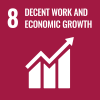Bangladesh, 24 April 2023 – Before tragedy befell Moharaj, he had travelled to the Middle East hoping for a better life for his family like thousands of other Bangladeshi migrant workers. He first went to Saudi Arabia in 1996, where he worked for 12 years. He returned to Tangail district in central Bangladesh after he had earned enough to provide for his family and to start a business in Bangladesh.
“I thought returning home after working hard in the Middle East for many years would bring me happiness and success. But unfortunately, fate had other plans for me,” Moharaj said.

Moharaj has emerged as a symbol of hope in his community. Photo: IOM 2021
His luck ran out and he suffered a series of misfortunes, including broken marriages, hard-earned savings lost to betrayals, dangerous re-migration, the horrors of modern slavery, an ailing daughter, and a severe accident.
After a couple of failed marriages, a heartbroken Moharaj decided to go to Dubai in 2015 with the help of a middleman. He worked as a manual labourer there, enduring long hours in harsh conditions. However, he was forced to return to Bangladesh due to a family dispute.

Memories from abroad remind Moharaj about the good and bad days of his migration journey. Photo: IOM 2021
After a short stay in Bangladesh, he set off again, searching for a better future. He went to Iraq, where he hoped to make it to Italy. From there, middlemen smuggled him into Syria along with other migrants before sending them off to Italy. He never made it to Italy.
In 2016, Moharaj eventually boarded an overloaded Greece-bound rubber boat from Syria with nearly a hundred refugees.
Stuck in a refugee camp on an island in Greece, a despondent Moharaj discovered that the International Organization for Migration (IOM) provided return support to migrants who voluntarily chose to return home. He decided to go back and start anew.

X-ray film of Moharaj’s broken leg. Photo: IOM 2021
However, once home, Moharaj nearly lost a leg after his speeding autorickshaw overturned and collided with a bridge. The accident shattered his thigh bone and left him permanently disabled. Following the accident, IOM extended him the necessary support through the Sustainable Reintegration and Improved Migration Governance (Prottasha) project.
Prottasha provided monetary, logistical, and emotional support, which helped rekindle hope in Moharaj and his family. He received in-kind and medical support worth over BDT 100,000 (USD 930). Prottasha also helped him acquire a disability card, making him eligible for government food support.

Moharaj's tea store is not just a simple shop in his community but also a vibrant social hub for customers, even at night. Photo: IOM 2021
Fatema, his wife, has supported him all along, providing care and support that never wavered, keeping him and their eldest daughter Maria alive during their darkest days. Maria had become critically ill at the same time as Moharaj’s accident. Maria is now recovering.
One bright light during this challenging time for the family was their youngest daughter Mahiya, a little fashionista who never misses an opportunity to flaunt her lovely dresses. Oblivious to the hardship her father went through, her playfulness and enjoyment breathed life into the family.
Moharaj has made good use of the assistance and financial literacy training offered by Prottasha, and now runs a successful tea shop. Through the earnings, he can support his family of five. His son, Jubayer, often lends him a helping hand in running the business.

Moharaj at home with his daughter. Photo: IOM 2021
Moharaj’s tea shop is in the heart of the mohalla (neighbourhood). It is more of a social hub than a mere store and attracts customers all day long. At night, it brightens up an otherwise mundane landscape.
Moharaj has become a figure of hope for other migrants who fall on hard times and return empty-handed and traumatized from distant foreign lands, which had once lured them with hope and possibilities. For many, he is Prottasha (hope) personified.
Funded by the European Union, the Prottasha project contributed to the sustainable reintegration of returnees in Bangladesh and the progressive achievement of Sustainable Development Goal 10.7 to facilitate orderly, safe, regular and responsible migration and mobility of people, including through the implementation of planned and well-managed policies.



